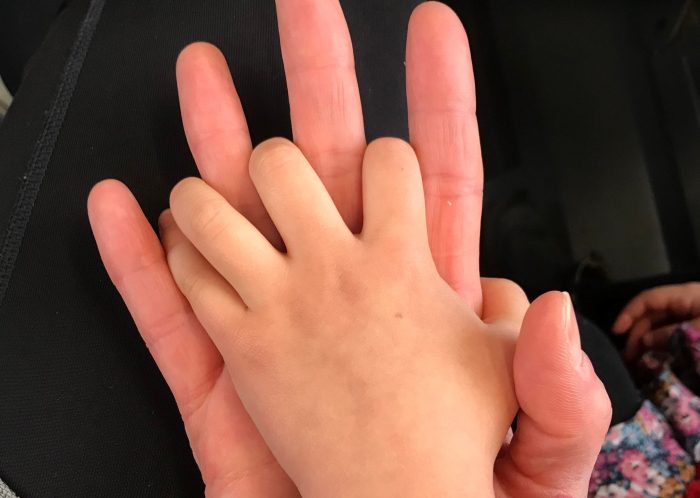We sat in my grandmother’s Berlin apartment around the small dining table with the old-fashioned tea set, cake, and biscuits like every Sunday.
Today, however, as my mother has prepped me on the way there, she said, “We have to speak to oma about getting someone in to wash and look after her once or twice a week.”
Oma is the German equivalent for gran, and my oma was nearing her 90th birthday. She was starting to get a little bit more confused and a little less agile every time we visited her, which, however, was not so reflected in her spirit. The latter was strong and stubborn—the way I had always known her.
I loved my grandmother dearly and had many fond memories of sleepovers and outings to the swimming pool, and of course endless home-cooked meals.
Whilst my mother, much like any working mother (I now know), was always this hectic, every rushing whirlwind, my grandmother was a beacon of calmness. Always there, always looking at me over the rim of those thick reading glasses. And during my later teenage years, I had perhaps taken advantage of her benevolence by accepting extra pocket money I knew was hard for her to come by and stuffing my face with her quality treats I only recently learned to really value.
On that Sunday afternoon, I had just turned 25. I went out on most weekends dancing in Berlin’s grimy clubs and drinking my financial allowance away in Berlin’s secret cocktail bars. I had neared the end of my law degree without ever really having known work life yet. And because or in spite of that, I was slightly arrogant, insolent, and I thought I was ready to take on life, which I had assumed was only waiting for someone like me to sweep on the scene and take it by the horns.
But here we were in oma’s apartment with the old cassette tapes of the Nutcracker no one has listened to in years, dust-covered poetry books she had read to me when I was little, and her light brownish sewing machine with which she mended my numerous clothes or made me new ones from scratch.
“Mummy,” my mother stated, “we want to talk to you about your ability to look after yourself and we thought it might be helpful to see if we could find a nice lady to come around and help you wash and help a little around the house. We just don’t want you to have another fall in the shower.”
Somehow, I was not part of the conversation as my grandmother and mother locked into a circle of two generations from which my own ignorance seemingly precluded me. I happily accepted and reached for a biscuit.
“I don’t need any help, and especially not from a stranger! I am doing fine by myself!” my grandmother said defensively.
My mother tried again, this time a different, more tender approach as I bellowed in between them, both shattering their protective membrane, “Oma, you simply aren’t able to do it on your own anymore. You need help. Stop being so stubborn all the time!”
She looked at me with her warm but determined grey eyes and shook her head. This stubbornness, I thought, is going to be me, too, in 50 years—if I make it this far.
On the way back in the car, I explained to my mother that I did not agree with her touchy-feely approach on this. “Just get someone in, vet them, and tell oma this is what is going down. She will get used to it and then perhaps even be grateful that she does not have to fight it anymore.”
At the red traffic light, my mother put her hand on mine and looked at me firmly: “Tina, this is not about what is the most convenient decision. This is about dignity. You can’t just take away her own free will and impose yours on her. She needs to come around to it herself, and we need to listen to her!”
Dignity, I thought. I haven’t thought about this word in years. It is one of those terms people need to think about before they try to attempt an explanation.
The only time I was really forced to think about the meaning of dignity was in my very first week of law school. In one of my lectures, we were instructed to open the first page of the German Constitution, as the sound of 100 or so never-before-opened constitutional hardbacks cracked through the auditorium. And there it was, beaming at me with all its statutory gravitas whilst I, the unsure, inexperienced, and slightly hungover fresher, stared at it in complete blankness.
Article I:
“A human’s dignity is inviolable.”
After the atrocities committed during the Third Reich and following the end of the Second World War, the German Constitution was meant to unify and impose a set of basic human rights that were to stand at the beginning of the constitution, never to be changed or diluted. It was a reminder of its absence in the years prior and an imposition never to disregard it again.
But what does human dignity really mean?
Its popular meaning has been overused and thus desensitized.
Complimenting someone on having behaved in a “dignified manner” I felt stifles people’s real sense of expression by reminding them (often women) of the fact that they should respond in a measured way.
But real dignity comes both from the external and the internal. It is the recognition that everyone is worthy of respect, recognizing someone’s humanity including the right to be treated as a human being.
It also means to guard the right to self-determination. And although its applicability has been malleable over the years, it now includes young and old, male and female, and, more recently, of course, also the right to identify as either or even both.
We often talk about dignity when we speak about a person’s final season of life. When they lose some of their capacity to look after themselves unaided. But every person has an innate dignity they are born with, and when you observe young children, even at their pre-verbal stage, you can see it: they are upset when this dignity is disregarded. When you take their food away before they are finished, or when their baby brother gets a preferred treatment, their outrage manifests itself.
Everyone wants to be seen and heard and have his or her true nature respected. And much suffering comes from the disregard or disapproval of this born-in nature and dignity.
Dignity requires both the individual’s expression of its own dignity and the external respect and validation of it.
Dignity is completely dependent on this interwoven connectedness between outer and inner acceptance. You might have an innate right to it, but it only comes out if you are being awarded it by those around you. And thus, it is so frail.
It is everyone else’s responsibility to preserve the dignity of those around them. Otherwise, it will not be expressed and eventually falters.
And with that in mind, we did sit at my grandmother’s table the following Sunday yet again, with the tea set, with the cakes, and instead of reaching for a biscuit, I reached for my beloved grandmother’s thin wrinkly hand. The one I had held all my life.
“Oma, I just want you to be comfortable, to sit with you here knowing you are wearing the clothes you want to wear and not the ones you can just get on. I want to laugh with you and do crosswords with you and not worry if maybe later that afternoon, you slip in the bath. Can’t you just give it a try? I know it’s not the most appealing part of the week, but then it’s done and you don’t have to worry about it anymore and can do the things you really want to do. If you do it on Fridays you can tell me about it on Sundays, what do you say?”
She laughed and put her hand on mine, “Okay then. You beat me down.”
I am not sure if I was manipulating her or respecting her dignity. But I do know that in that moment, I saw her need for dignity and she fought for it in the way that made me proud of her.
My grandmother passed away a couple of years after that. I visited her in hospital regularly, and every time she put her hand on mine, I remembered that moment we had—when I saw that flickering, dignified light in her.
Fifteen years on, I pick my five-year-old son up from school. He skips next to me, pulling my arm back and forth. “What did you learn today in Assembly Oscar?” I ask him.
“Today, we learned about respect and dignity,” he says confidently.
I am not sure a bunch of five-year-olds can grasp a concept I seemed to have grappled with even in my early adulthood. But my son’s school is a UNICEF-rights respecting school, and as such, they do talk about the fundamental rights each child has.
“Do you know what dignity is?” I ask him.
“Not really. Is it that you are meant to be kind and share your pudding at lunchtime?”
I squirm around.
“Let’s talk about it tonight,” I say and buy myself a little more time.









Read 10 comments and reply